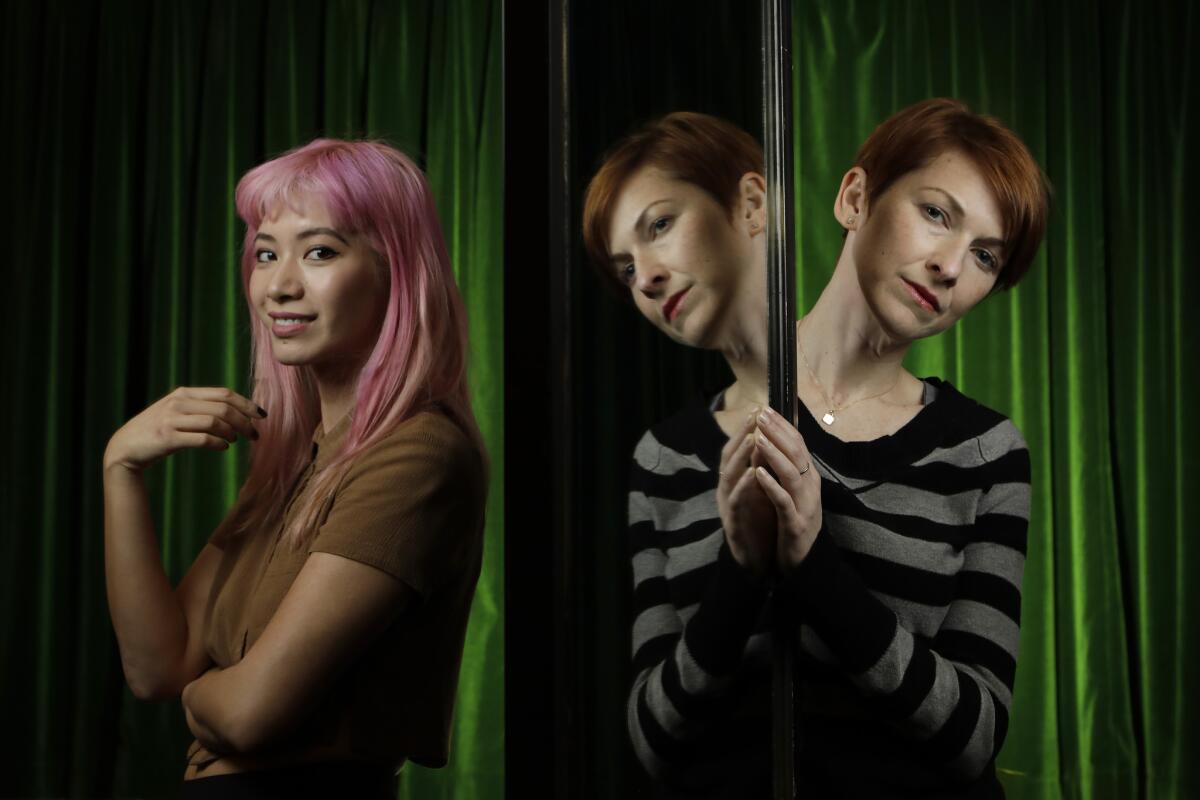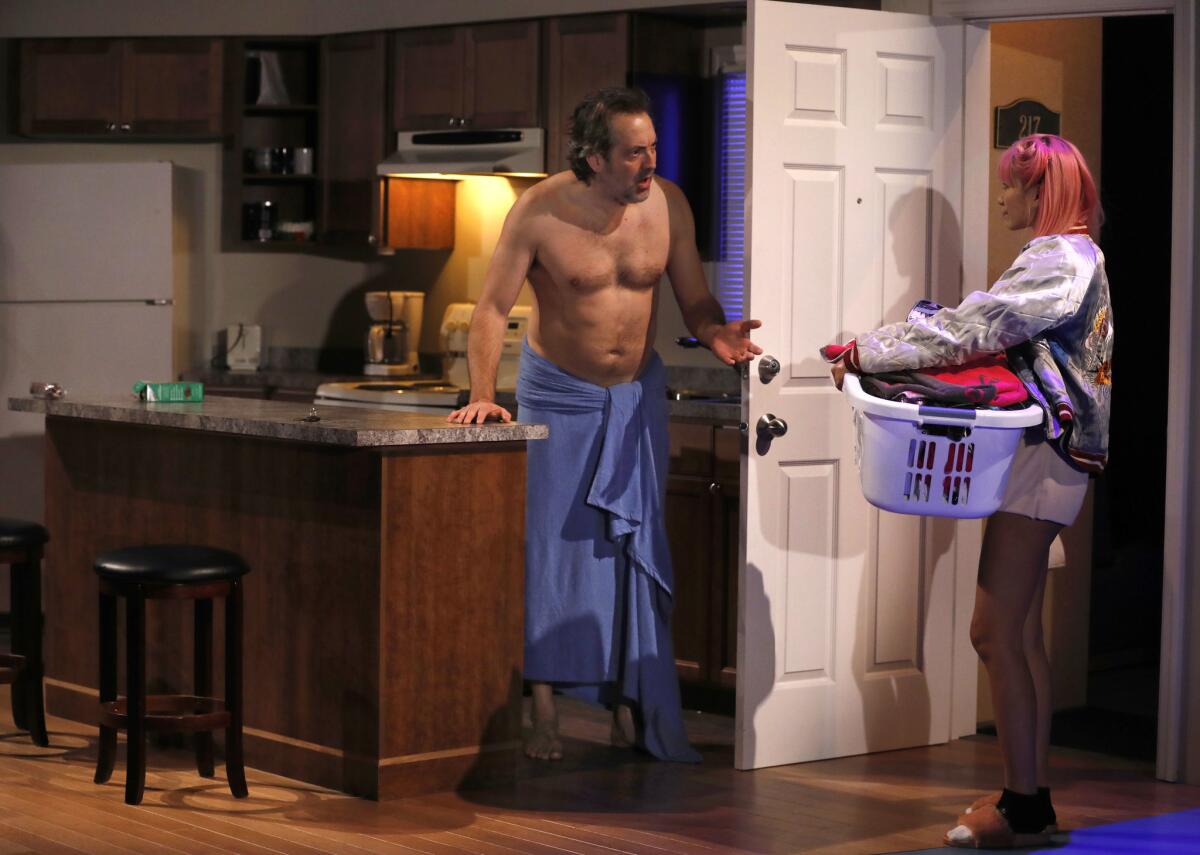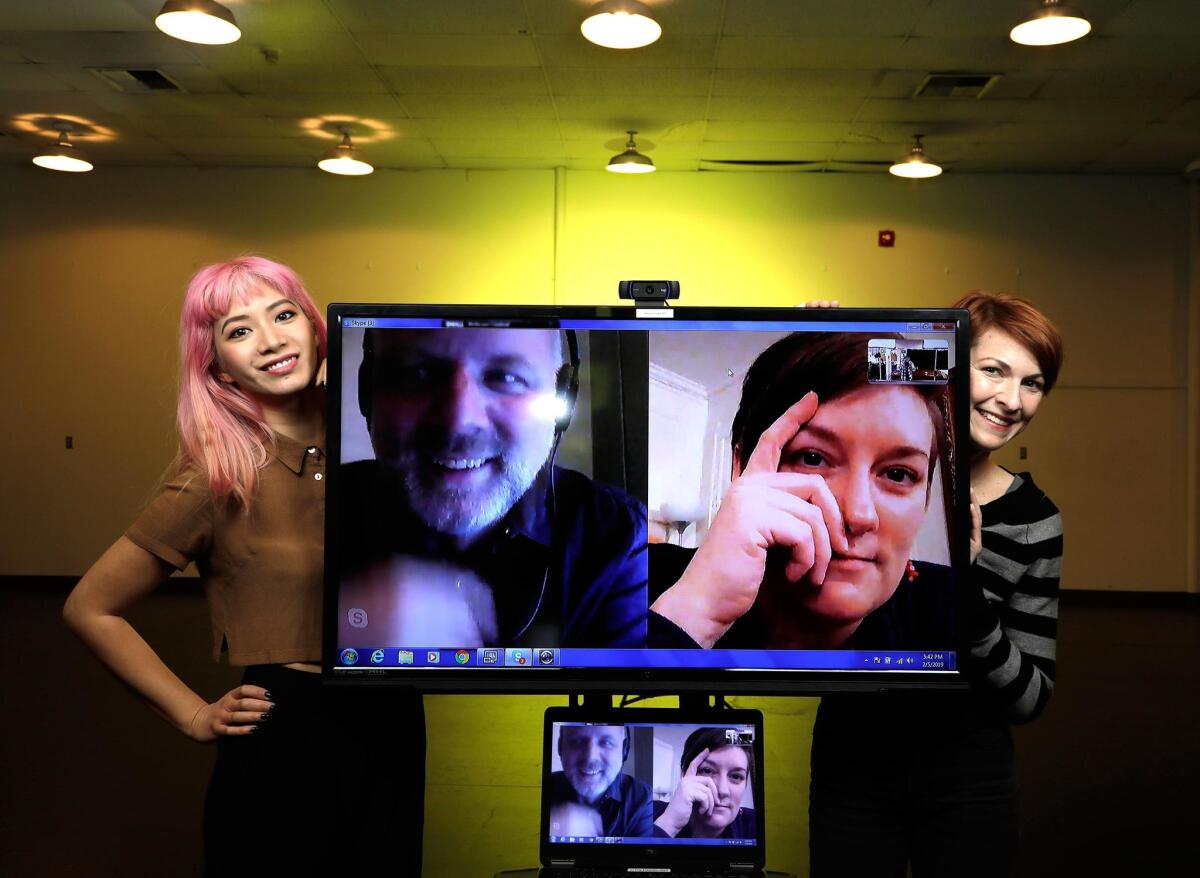Nudity in the theater? The actors of ‘Linda Vista’ have it covered

- Share via
In the darkly comic play “Linda Vista” at the Mark Taper Forum, three lead actors get naked. Not semi-naked, but totally naked. And not to take a bath or get dressed, but in service of some searingly awkward — and, thus, deeply human — sex scenes.
The nudity has struck some theatergoers as so extreme and the sex so prolonged that the actors can hear members of the audience gasp when it begins.
Occasionally someone will say, “Oh no, oh no, oh no!” Cora Vander Broek says of the moment the stage lights rise on her character, Jules, straddling Wheeler (played by Ian Barford) in bed.
Sometimes you can see people covering their eyes or mouths, adds Chantal Thuy of her character’s sex scene (also with Barford).
“You would think that would make me feel more self-conscious,” Vander Broek says of the visceral reactions. “But it actually makes me feel safe, because it tells me that I am held in the arms of a beautiful play.”
Vander Broek and Thuy sit in a rehearsal room at the Music Center Annex in downtown L.A., joined on Skype by director Dexter Bullard and intimacy consultant Kristina Fluty. The group is engaging in a round-table discussion about nudity in the theater — its effect, its importance and its perils.

In the day and age we’re living in, we’ve come to a place where frank conversations are necessary.
— Cora Vander Broek
Variations of the word “safe” come up quite a bit, because the actors are making themselves vulnerable — physically and emotionally. It’s why Bullard recruited the help of Fluty, a modern dancer with a master’s degree in dance movement therapy and counseling.
Fluty has worked as an intimacy consultant on six plays in less than a year—a testament to the rising profile of the field in the wake of #MeToo.
“In the day and age we’re living in, we’ve come to a place where frank conversations are necessary,” says Vander Broek.
Fluty makes sure the actors feel secure and listened to. She provides them with mental health tips and tricks, including meditations, in case they find themselves feeling less than OK. She sets parameters for dealing with nudity and sexuality, and she makes sure those parameters are adhered to.
She’s also a stickler for anatomically correct language, and she forbids the use of slang for any body part.
“You wouldn’t say, ‘Hey, is it OK if I grab your boobs here?’ ” Fluty says, adding that she teaches actors to say “breast” and use what she likes to call “bony landmarks” when choreographing a sex scene, meaning: “parts of the pelvis that are specific, so I can say, ‘Put your hand right here on her sacrum,’ or, ‘Put your hand under the gluteal fold.’ ”

Thuy and Vander Broek were particularly thankful for the open dialogue Fluty fostered.
“Early on in our conversations, we talked about what our boundaries were,” Thuy recalls. “And I would say, ‘This is OK for me, and this is the no-go zone,’ and that was always protected.”
Vander Broek, whose character masturbates onstage, said it was important that the act did not come across as a performative moment for her male partner but rather as a deeply personal moment for her own character. Having Fluty’s input was crucial to her development of — and comfort with — that scene.
None of this care or attention would matter, Bullard says, if the script weren’t good. Bad writing could easily make the nudity and sex seem gratuitous rather than essential to the fabric of the story. Crucial to the artists’ participation in the play was the fact that “Linda Vista” was penned by Pulitzer Prize winner Tracy Letts.
The play dissects the character flaws of a committed misanthrope named Wheeler who, in the midst of a messy divorce and an ugly midlife crisis, drags down just about everybody around him, including the two women he professes to care for most, Jules and Thuy’s Minnie.
In classic Letts’ fashion, the dialogue ricochets between pathos and caustic wit, with an ear toward laying his characters’ inner souls painfully bare in the process. In this play, Letts also lays them physically bare, which, to director Bullard’s mind, is especially effective in the context of a story about profound human frailty.
“Just because we’re following people into the bedroom doesn’t mean the actors aren’t doing what they’ve done the whole show,” Bullard says. “There’s a lot of emotional vulnerability and nakedness in ‘Linda Vista,’ which in some ways is as complicated as the physical nakedness and intimacy.”
After the play’s first sex scene, in which Jules and Wheeler have an immensely awkward misunderstanding, the actors repair to the living room for a scene that shows them verbally dancing around their mutual romantic fears.
In that subsequent scene, Bullard says, “The audience really begins to relax into a brand-new way of experiencing the play that I actually think casts one of the deeper spells — in terms of what a scene feels like — that I’ve been around.”
This is because, say all involved, sex and nudity onstage create a distinct bond with the audience, one that places the onlookers in league with the actors.
“They have become intimate with the actors too, in a way,” Bullard says. “Whereas, if there was no nudity, they would be able to keep a distance.”
It may seem strange that sex and nudity strike theatergoers as novel, even shocking, when our culture is rife with both in television and on film. But there is something about nudity in theater — its immediacy, maybe, or the fact that it’s happening live in front of hundreds of strangers — that can feel particularly compelling.
Thuy can’t necessarily see the audience’s faces all the time, but she can feel their energy, and she knows that they are coming along for the ride. She says she has felt more vulnerable and self-conscious on film, with a camera right up in her face and all sorts of distracted people standing around set.
“Theater humanizes. I’ve never felt objectified in theater,” she says. “But in TV, there is heavy objectification of a woman’s body.”
The history of nudity in theater is long, of course, and Bullard cited groups such as New York’s experimental Living Theatre company, members of which were arrested for indecent exposure in the 1960s after disrobing in the play “Paradise Now.”
Representatives for Center Theatre Group, which is staging the Steppenwolf Theatre Company production of “Linda Vista,” could not recall another CTG production with as much sex and nudity as Letts’ play. Complaints, however, have been minimal, the company said.
The company added advisory language to ads for the show — adult content, nudity, frank depictions of sex, recommended for ages 16-plus — after realizing from social media chatter that some patrons were missing the warning on CTG’s website.
The “Linda Vista” creative team and actors aren’t worried, though. They say the story they are telling is elevated by the art made tangible via their bare bodies, and that audience reaction is sympathetic and reciprocal.
Says Fluty, “There’s something very beautiful when bodies attune with each other, once people get over the initial, ‘Oh my gosh, they’re naked!’ response.”
♦ ♦ ♦ ♦ ♦ ♦ ♦ ♦ ♦ ♦ ♦
‘Linda Vista’
Where: Mark Taper Forum, 135 N. Grand Ave., L.A.
When: 8 p.m. through Friday, 2:30 and 8 p.m. Saturday, 1 and 6:30 p.m. Sunday; ends Sunday
Tickets: $30-$99 (subject to change)
Information: (213) 628-2772 or centertheatregroup.org
More to Read
The biggest entertainment stories
Get our big stories about Hollywood, film, television, music, arts, culture and more right in your inbox as soon as they publish.
You may occasionally receive promotional content from the Los Angeles Times.











